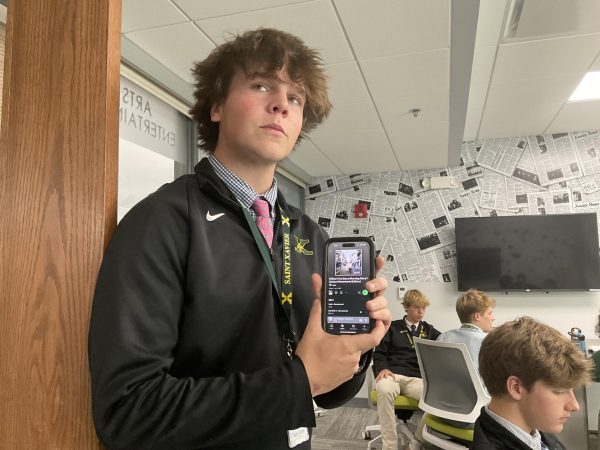iPadless
It took me almost 40 minutes to realize what I was missing. Every morning, when I leave the house, I’m plagued by the lingering feeling that I’m forgetting something. Usually it turns out to be nothing; today it didn’t. I was threading through the throng of students making their way to their respective homerooms when I casually glanced down at the stack of binders in my hands. Something just didn’t look right. Then it hit me: the empty space where my iPad belonged was exactly that, an empty space.
I immediately made a U-turn back to my car, hoping that I’d find it sitting in my back seat. No such luck. At this point, I was beginning to get anxious; for some of St. Xavier’s stricter teachers, forgetting one’s iPad is worth a JUG. Though I didn’t think any of mine would be among that number, one can never be too sure. Not only that, but what if my teachers needed to do work on the iPad for class? I’d be unable to learn, spending period after period staring at a wall while everyone else’s eyes would be fixed on screens. Going home to retrieve it wasn’t an option, so I had no choice but to go to school without my schoolwork.
The school day was passable, although boring. I didn’t need my iPad for the majority of my classes, and for those who did, I was often able to make due with a desktop. Though I was unable to participate in some in-class activities, my productivity benefited from the sudden disappearance of distraction. In a day of guided paper notes and tangible tests, my iPad wasn’t necessary, and its absence, as inconvenient as it was, helped me get more done than I would have with it.
There were a few close calls where I was worried a JUG was coming my way. During my Journalism class, I was using a desktop to work on a story that I would normally have written on my iPad. When my teacher asked me what I had been working on, I let slip that I had left my most important tool at home. He didn’t mind since it didn’t impede my productivity, but for a second I felt my stomach drop. During Spanish, my teacher let me use his iPad to participate in a Kahoot. Though the gesture was generous and I appreciated avoiding a JUG, it may have been better if I had avoided the Kahoot altogether; I got second to last in the class.
However, the most harrowing experience of the day was in World Religions. We were filling out worksheets on Hinduism and the video reference we were supposed to use was, of course, on our iPads. Shakily pulling dusty World Civ knowledge from the recesses of my brain, I was able to muddle my way through the assignment, but not without some searching glances from my teacher, who was no doubt wondering where my iPad had run off to. The answer to that question was my kitchen counter. Regardless, I escaped the day without a JUG, so I was satisfied.
My day may have been stressful at times, but many of my classes remained unaffected by my faulty memory. Psychology, Calculus, and AP Literature didn’t require iPad use that day, and I was able to work on my schoolwork as opposed to getting distracted. My productivity was boosted in Study Hall, where I hammered out some studying and required reading instead of texting my friends. Though it had its drawbacks, my day without my iPad ultimately increased my productivity.
But just because I was more productive for one day with my iPad doesn’t necessarily mean it was a good thing to forget it. For one, I could have gotten a JUG. I did my best to avoid that by keeping my head down and my mouth shut, but increased productivity isn’t worth a JUG. It also goes without saying that the day was remarkably boring without my iPad. Some classes were passable, but others had vast stretches of time devoted to solo work, time I spent catching up on required reading and staring at walls. Forgetting my iPad gave me an appreciated short-term efficiency boost, but I wouldn’t advise it, especially for an extended period of time. For me, the benefits don’t outweigh the detriments on this one.

He is a senior and is involved in NHS, the St. X swim team, and the Lakeside Seahawks. Patrick also lifeguards at Lakeside Swim Club. He has the luck or...














